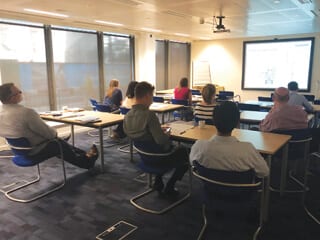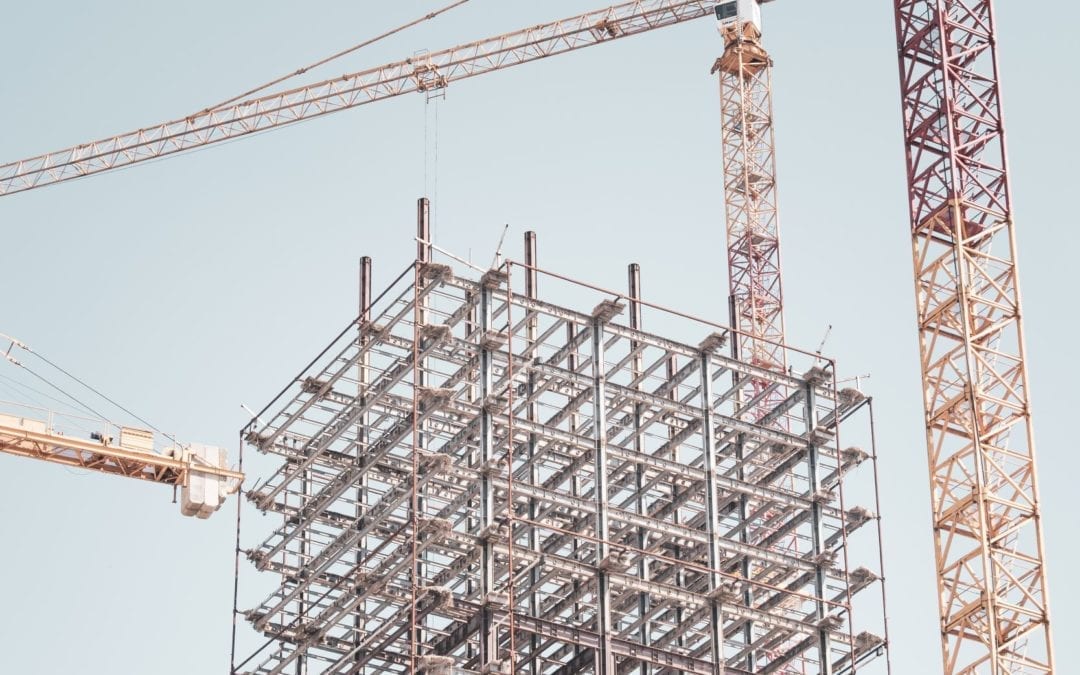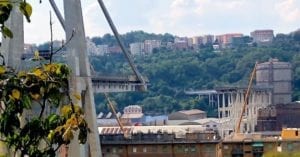
Blogs, Conferences and Events, Corrosion Engineering Division, Latest News, YEP
Could you solve this case study and become a big winner?
The young engineers in the Institute of Corrosion’s Young Engineer Programme are an innovative bunch. There was no way that the coronavirus lockdown and curtailing of mass gatherings was going to stop them in their tracks.
Instead of in the elegant Royal Over-Seas League club in London, these intrepid young engineers gathered around their computer screens at home to learn of the 2020 Case Study that will be used to determine which group of young engineers will be the winners of this year’s star prize. It was the first time that an ICorr Young Engineers group had met online, but was so successful that it is unlikely to be the last.
2018’s Winning Young Engineers group whet appetites for success
With an appraisal of their winning case study from 2018, Caroline Allanach, Danny Burkle and Tim Evans whet the appetites for success of the young engineers in attendance online during the evening.
The insight they provided as to how they approached their task, and a critical assessment of their reaction and solution to the failure that occurred was both informative and entertaining. So, too, was their description of the prize they won – a tremendous trip to the 2019 NACE Conference in Nashville.
A corrosion conundrum is this year’s case study
There are seven participating groups in this year’s Young Engineer Programme case study, and they have been given quite a conundrum to unravel.
The case study was presented by Steve Paterson, from Arbeadie Consultants Ltd., who has a career of corrosion experience to draw on. He hasn’t made it easy for this year’s programme participants. Here is the scenario he has set:
- Several leaks have been identified in the titanium piping in an onshore desalination plant
- This plant is used to remove salts from mono-ethylene glycol
- The plant is also used for hydration and corrosion control in gas pipelines from three offshore fields
At the end of the presentation, the 32 young engineers were posed with the problems they must work to overcome, which include:
- How to perform a corrosion risk assessment to determine that the plant is safe to operate
- Recommending alternative materials to use
- Identifying what mitigation options could be used to prolong the life of this section of the desalination plant
- Identifying the root cause of the corrosion
Online meetings can get lively!
The young engineers in this year’s intake come from 19 companies, and their specialities include mechanical and materials engineering, welding, materials, and more. With such diversity, you might expect a lively meeting when in a meeting room. It was hard to know what to expect online, though.
The discussions that followed the presentation of the case study proved that no matter how we get together, when there’s an interesting and provocative scenario put forward, online events can be just as lively as in-person meetings.
The range of experience and specialties were certainly put to the test, and the question and answer session proved to be the first opportunity for ideas and complexities to be explored.
In brief, a fruitful, useful and exciting meeting, aptly brought to a close by Trevor Osborne, a past President of the Institute of Corrosion, and Managing Director of Deepwater Corrosion services (UK) Ltd.
The big wait begins!
And so, the big wait begins. It will be several months before we learn which group of young engineers will be this year’s winner.
The groups now undertake further investigation, collaborating behind the scenes and aided by four more lectures, and the help of a mentor assigned to each group, before presenting their case studies in November.
Could you be a future winner in the Young Engineer Programme?
Watch this space! The Young Engineer Programme is held biannually. To learn how you could become a winner, visit our YEP pages or email the Institute of Corrosion at admin@icorr.org.

Blogs, Conferences and Events, Corrosion Engineering Division
Marine Corrosion Forum and ICorr Aberdeen Branch bring expertise to your laptop
The world is in the grip of the COVID-19 pandemic. Many countries are in lockdown, and economies are on hold. But some things won’t let the coronavirus get in their way. Corrosion has a catastrophic effect on infrastructure and transport if it is ignored – just one reason why World Corrosion Awareness Day is so important.
Here at the Institute of Corrosion, we are also refusing to stand still. We understand that training and development is key to your personal success – especially during the coronavirus lockdown. The training and development initiatives that we have in place with our partners to help you with your CPD include many online options.
In this post, you’ll learn about another – a whole business week of hour-long webinars that are virtual and free, hosted by Phil Dent (Chair of the Marine Corrosion Forum) and Stephen Tate (Institute of Corrosion Aberdeen Branch).
Why a week of corrosion webinars?
The lockdown has disrupted almost all the training and events in the corrosion industry. Training providers and events organisers have had to cancel public events, and if these don’t take place then the industry is left with a void in the learning and sharing of information and innovation.
These webinars replace what would have been a full day event held in Aberdeen on 29th April.
When is the week of corrosion webinars?
The webinars will take place between April 27th and May 1st inclusive, with each webinar lasting an hour and starting at noon. Each is presented by an expert in their field. The time of the webinars has been selected to allow as many people to participate as possible.
How can I participate in the webinars?
Each webinar will follow the same format, and will be hosted on GoToMeeting:
- A one-hour subject presentation
- Q&A session via the chat box at the end of the presentation
How do I register for the webinars?
Registration couldn’t be easier. All you need do is head to the webinar registration page on the Marine Corrosion Forum website and register for the link to each webinar that you wish to attend.
When you register, you’ll be given the URL for attendance and an access code immediately, and your registration details will be sent via email.
What are the presentations?
The five webinars cover a range of key corrosion themes. Registering for them individually allows you to participate in those that are most relevant to you – or all five, of course. The webinars are:
- The Six Core Elements of Asset Management – April 27th
- Corrosion Under Insulation Online Monitoring with Electro-Magnetic Guided Radar (EMGR) – April 28th
- Hot Topic: Cold Bonding, Using Epoxy Adhesives in Place of Hot Metal Welding – April 29th
- An Overview of the Corrosion of Metals in Seawater (And What to Look for) – April 30th
- Exploring High Pressure CO2 Annular Corrosion in Flexible Pipes – May 1st
Tell me more about the webinars
Here’s a little insight about each of the webinars.
The Six Core Elements of Asset Management
27th April 2020, 12pm
Register for this webinar here
Presented by Adam Lea-Bischinger CEng CMgr MEng CMRP Eur. Ing of the Institute of Asset Management (IAM), this presentation examines the critical work of the IAM and the development and rollout of ISO 55000 which defines terminology, requirements, and guidance for implementing, maintaining and improving an effective asset management system. The presentation includes examples of UK companies operating the ISO 55000 system.
Corrosion Under Insulation Online Monitoring with Electro-Magnetic Guided Radar (EMGR)
28th April 2020, 12pm
Register for this webinar here
Presented by Dr Prafull Sharma, an inventor and Chief Technology Officer of CorrosionRADAR Ltd., you’ll learn why corrosion under insulation (CUI) continues to be a big challenge for the asset integrity management of industrial facilities, and about the growing trend to remotely monitor corrosion in accessible locations using wireless connectivity and battery-powered devices. You’ll also learn about the latest innovative sensor system for monitoring CUI that has been developed by CorrosionRADAR.
Hot Topic: Cold Bonding, Using Epoxy Adhesives in Place of Hot Metal Welding
29th April 2020, 12pm
Register for this webinar here
Presented by Henry Smith, UK Technical Supervisor of Belzona Polymerics Ltd, this webinar examines the options available to the offshore fabric maintenance engineer when it is not possible or preferable to weld, and discusses viable solutions using bonding or cold-welding technologies. You will benefit from references to case histories, from initial design to installation and ongoing inspection.
An Overview of the Corrosion of Metals in Seawater (And What to Look for)
30th April 2020, 12pm
Register for this webinar here
Presented by Carol Powell BSc, a Fellow of the Institute of Materials, Minerals and Mining, and independent consultant, this webinar provides a brief overview of the world of metals and their response to one of the most aggressive environments there is, giving examples of the types of corrosion which can occur and how to avoid them.
Exploring High Pressure CO2 Annular Corrosion in Flexible Pipes
1st May 2020, 12pm
Register for this webinar here
Presented by Maria-Eleni Mitzithra PhD and Senior Project Leader for Corrosion at TWI Ltd., this webinar focuses on the work conducted by Mitzithra and tests carried out in a lab-scale test system designed and built at TWI Ltd. for the simulation of complex annulus environments, describing corrosion rates and the link to stability, structure, and thickness of the precipitated iron carbonate scaling.
A positive response with online training and events
This week of webinars replaces the MCF meeting in Aberdeen that was due to be held on 29th April. The Institute of Corrosion has partnered with MCF to offer these webinars as an alternative, and opened them to members and non-members of ICorr and MCF. You’ll be able to gain insight into the subjects that were to be presented and discussed at the Aberdeen meeting from home, work, or other location, and it’s free of charge.
As the lockdown and COVID-19 pandemic evolves, we are proud to bring you online options like this to help you continue your personal professional growth – just one example of the benefits of membership of the Institute of Corrosion.
For details about membership of the Institute of Corrosion, visit our membership page.
Corrosion Engineering Division, Latest News
Unfortunately, after careful consideration, the CED has decided to postpone the working day scheduled for Wednesday April 29th 2020 at the National Railway Museum, York, entitled ‘Corrosion Control in Transport and Infrastructure’. This decision was made in the interests of the welfare and safety of our members and other attendees in view of the evolving risks from the spread of
coronavirus (COVID-19). Anyone who has already registered for the meeting will be refunded in full.
It is hoped to reschedule the event for the autumn and more details will be provided when the national health situation has become clearer.

Blogs, Conferences and Events, Corrosion Engineering Division
How to Benefit from Institute of Corrosion T&D Initiatives Online
With the coronavirus lockdown firmly in place in most parts of the world, businesses and people are adjusting to the new normal. One of the hardest hit business activities is training and development. This is bad for businesses and their employees. Of course, the safety of employees is critical but so, too, is the continual upskilling and development of those employees.
Analysis by McKinsey in early March found that already around half of in-person training and development programs had been cancelled through to the end of June 2020. As the extent of lockdown has increased across geographies, this rate of curtailment will have snowballed.
Given that your professional development is key to both your career and the future of your employer, what has been the response by businesses and how can you keep your career on track?
3 Training and Development Strategies Adopted by Businesses
Generally, we’ve seen three approaches to training and development during the lockdown:
1. Suspend/cancel training & development
Some businesses have drastically cut back or even cancelled all their training and development. They have done this to reduce costs. Some of these companies have laid off staff and are seeking to recruit experienced people to help them through this difficult period. (Staffing Future is the first company we know that has developed a not-for-profit recruitment website to match people to jobs that suit their skills specifically for COVID-19 jobs in the UK and the United States.)
2. Transition training & development as an online resource
Other businesses are helping their employees adjust to online working and encouraging continuation of CPD by transitioning existing training and development as an online resource. Such organisations are using working from home as an initiator to encourage upskilling toward a new normal that is likely to include more working from home – even after the lockdown has ended.
3. Increase accessibility to training & development
The third business model is increasing capacity and accessibility to training and development. The issue that many businesses have here is that their IT capability is already stretched. They simply don’t have the bandwidth to offer the desired depth and breadth of training and development to an army of employees wishing to connect via video.
Online Training & Development with the Institute of Corrosion
Organisations have been forced to prioritise their approach to training and development – for both what they believe is needed and what they can reasonably provide. This has necessarily meant that much training and development has been postponed or cancelled. The knock-on effect for individuals is that their own CPD – and therefore their career path – has been put on ice.
As a not-for-profit organisation committed to continuous development of knowledge and expertise within a supportive and inclusive framework (read about our core values here), the Institute of Corrosion is adjusting to the current lockdown environment at pace. We understand that it is imperative for industry professionals and members of the Institute of Corrosion to continue to develop professionally.
Training and development initiatives that we have in place include:
- A series of online training courses that can be accessed via the training and qualification pages on the ICorr website.
- The Industrial Coating Applicator Training Scheme (ICATS) ICA module is now available online. You can learn the theoretical aspects of application and complete all the tests within the programme from the comfort of your own home during lockdown. For further information, please email Kevin Harold at Kev@paintel.co.uk.
- One of our training partners, Corrodere, specialise in providing training packages developed with industry experts to ensure that users gain insight into basic corrosion, methods of surface treatment and application of protective coatings – with many of its courses available through online training. Contact Corrodere for more information.
- We are working with other training providers to enable you to continue your professional development during lockdown. For example, IMechE Argyll Ruane are working on the delivery of an online classroom-style training programme. Further announcements will be made as soon as this is available, but please email argyllruane@imeche.org for more information.
- We’re also in the process of transitioning the Fundamentals of Corrosion course for delivery online. Please, if you are interested in learning more and participating online, contact admin@icorr.org.
5 Benefits of Online Training
Because you are working from home or furloughed, you don’t need to put your professional development on hold. In fact, the online training and development initiatives we have already released and those that we are working on will help you develop a broader appeal as the world returns to work. The benefits of online training include:
- More affordable – online training and development can generally be delivered at reduced rates (and sometimes free, as with our Corrosion Engineering Division Working Day, which is now being held online)
- More flexible – adaptable to different learning styles and flexible to fit your personal timetable
- More convenient – take your course with you wherever you are, and balance between your work and free time
- More comfortable – if you don’t like sitting in classrooms, you’ll love learning in the comfort of your own home
- Improves career prospects – with more time on your hands and more flexibility to learn, taking online courses during the COVID-19 lockdown will demonstrate your commitment as well as provide valuable skills and knowledge that will help to develop your career
Make sure your career stays on track. Stay tuned to the Institute of Corrosion blog to learn of the latest developments in training and development in the corrosion industry.

Blogs, Conferences and Events, Corrosion Engineering Division
The Real Cost of Poor Corrosion Prevention Practices Is Human
The financial cost of corrosion to the global economy is enormous, and estimated to be more than 3% of global GDP. Corrosion control is essential to reducing this cost, and is critical within infrastructure and transport. The economic benefits of longer life of transport and infrastructure assets are clear. Therefore, it is crucial that governments and businesses invest in corrosion control.
However, there is a far bigger reason why the Institute of Corrosion is leading the global corrosion conversation. People’s lives depend upon it.
Catastrophe is the real cost of infrastructure corrosion
 In August 2015, the catastrophic effects of a lack of corrosion management was made abundantly clear in Italy. During a violent storm in Genoa, the Morandi Bridge collapsed. 43 people lost their lives. It is not as if the disaster could not have been foreseen. Its designer Riccardo Morandi warned of the risk of corrosion to the bridge all the way back in 1979. He said:
In August 2015, the catastrophic effects of a lack of corrosion management was made abundantly clear in Italy. During a violent storm in Genoa, the Morandi Bridge collapsed. 43 people lost their lives. It is not as if the disaster could not have been foreseen. Its designer Riccardo Morandi warned of the risk of corrosion to the bridge all the way back in 1979. He said:
“Sooner or later, maybe in a few years, it will be necessary to resort to a treatment consisting of the removal of all traces of rust on the exposure of the reinforcements, to fill in the patches.”
Indeed, of all infrastructure, bridge collapses have been one of the most common examples of the cost of lack of corrosion control. Other notable bridge collapses include the following tragedies:
- Silver Bridge, on a major highway in the United States, collapsed under the weight of rush hour traffic one afternoon in December 1967. A total of 75 vehicles crashed into the Ohio River. Nine people were seriously injured. 46 people were killed. The cause? Corrosion fatigue of the bridge’s suspension chain.
- The pedestrian section of the Gokhale Bridge in Mumbai collapsed in July 2019 due to corrosion, killing one person and injuring four others.
- Preliminary evidence points to corrosion as the cause for the sudden collapse of the Nanfang’ao Bridge in Taiwan. One of only two bifurcated single-arch bridges in the world – and only 20 years old – the 320-ton bridge killed six people when it fell in October 2019.
Inevitably, when corrosion control is ignored or mismanaged on highway bridges, buildings and other infrastructure, that infrastructure is weakened and lives are put at risk.
Corrosion causes tragedy in transport disasters
Corrosion is also a huge financial cost to the transport economy. Components that corrode must be repaired or replaced, and can cause breakdown and costly delays. Massive ships have enabled vast amounts of goods to be transported around the world, but they only last around 30 years before they must be scrapped due to the effects of corrosion.
Once more, though, the financial cost pales into insignificance when compared to the human cost of poor corrosion management. Examples include:
Join the corrosion control conversation
The first of our core values is Trust and Respect. The Institute of Corrosion is an independent professional body, trusted and respected by the public with the goal of reducing the environmental impact of corrosion on our infrastructure.
It is crucial that we encourage the innovation that enables greater sustainability of our infrastructure and transport. Developments in corrosion science, prevention and management should reduce (and, eventually, eliminate) the cost of corrosion to society.
To this end, we have designed this year’s Corrosion Engineering Division (CED) Working Day around corrosion control in transport and infrastructure. Held on 29th April 2020, only five days after Worldwide Corrosion Awareness Day, the original venue could not have been more appropriate – the meeting was to be held at the National Railway Museum, York. However, as you know, world events have overtaken us this year. Consequently, we are now holding the Working Day online.
It remains a fantastic opportunity to network with other professionals from different industry sectors (albeit through cyberspace and not face-to-face) and to learn about some of the latest developments in the field of corrosion control in a variety of transport and infrastructure applications across diverse industries.
This full day event will now be free. We have an excellent group of speakers lined up, including Phillip Watkinson (Corrocoat), Chris Atkins (Mott MacDonald), Steve Paterson (Arbeadie Consultants), Cliff Harris and Clive Harrison (Jacobs), and Pablo Merino (CLH Pipeline Systems). The series of lectures will cover:
- Fascinating Uses of Heavy Duty Glassflake Coatings in Transport Applications
- Innovations in Preserving Transport Infrastructure
- Managing Corrosion in Ageing Offshore Infrastructures
- Corrosion Monitoring of Dry Fuel Storage Containers in Nuclear Facilities
- A New CP Approach on Non-Isolated and Aged Pipelines: A Case Study
If you are interested in taking part, please send an email to admin@icorr.org by 24th April. In return we will send you a link to be able to join the meeting. Please also indicate which working group discussion you would like to join in the afternoon.
Corrosion Engineering Division, Latest News
Wednesday 29 April- The National Railway Museum
Institute of Corrosion’s Corrosion Engineering Division
SYMPOSIUM ON
‘Corrosion Control in Transport and Infrastructure’
This one day meeting will be the latest in a series of recent working days of the Institute of Corrosion’s Corrosion Engineering Division. The meeting will be held at the National Railway Museum, York. This year’s meeting is wide ranging and covers Corrosion Control in Transport and Infrastructure. After the talks, the meeting will break up into the individual CED working groups. In parallel there will be a chance to visit the railway museum. Where possible, agendas for the working group meetings will be published separately in advance on the CED web site (https://www.icorr.org/icorr-structure/). The 2020 Paul McIntyre Award will be presented after the morning lectures. This working day will be a good opportunity to network with other corrosion professionals from different industry sectors and to learn about some of the latest developments in the field of corrosion control in a variety of transport and infrastructure applications across diverse industries. For information on becoming involved with CED working parties please see the CED web site or contact the Chair of CED, Nick Smart (nick.smart@woodplc.com). For registration to attend the meeting, please complete and return the registration form.





